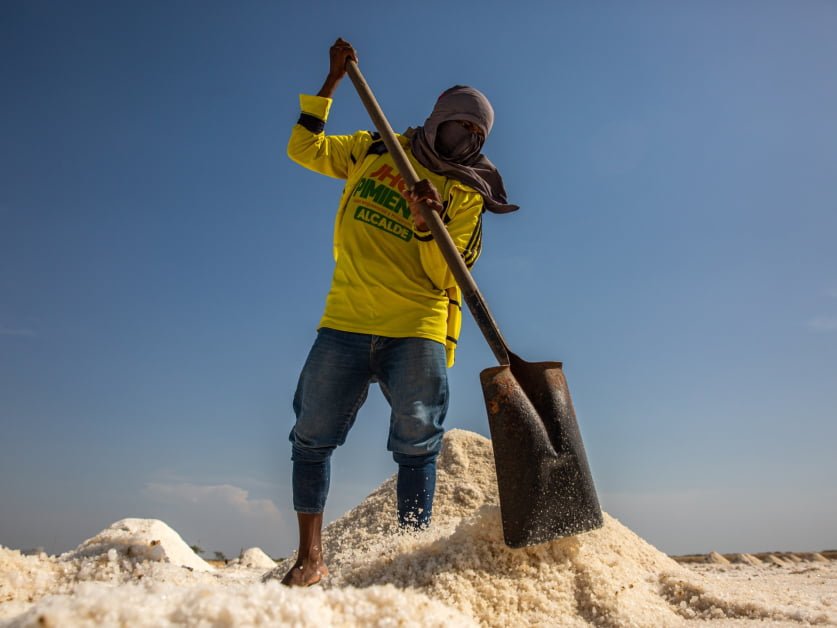The Salt Industry in La Guajira, Colombia: A Potential Solution to Starvation
Exploring the Role of Salt in Alleviating Hunger
Salt has long been a vital resource in the barren salt flats of La Guajira, Colombia, where it is referred to as “white gold.” This region, known for its vast salt production, has sustained entire communities of the local Wayuu Indigenous people. However, the salt industry is now facing challenges that threaten its survival, prompting a significant investment proposal by Gustavo Petro’s administration.
A History of Salt Mining in La Guajira
Located on a peninsula along the Caribbean Sea, La Guajira boasts a harsh, desert-like climate that is conducive to salt production. Even before European colonization, Indigenous communities in La Guajira harvested salt for trade. Today, salt mining remains a primary source of income for the Wayuu people, who labor in the salt ponds of Manaure to extract salt crystals using traditional methods.
Despite the potential wealth generated by the salt ponds, poverty is rampant in La Guajira. While the salt ponds have the capacity to produce significant amounts of salt, the actual output falls short of its potential. This has contributed to a surge in poverty levels, with over 65% of La Guajira’s population living below the poverty line. Tragically, malnutrition rates are high, with a significant number of children succumbing to acute malnutrition in the region.
Challenges and Opportunities in the Salt Industry
Mismanagement and lack of proper governance have exacerbated the economic instability in La Guajira. The transition from government-controlled salt mines to a public-private partnership known as the Maritime Salt Flats of Manaure (SAMA) has been met with mixed results. Indigenous communities have struggled to assert their rights over the territory while navigating the complexities of managing the salt industry.
Moving Forward: A Call for Sustainable Solutions
As La Guajira grapples with poverty and drought, there is a pressing need for sustainable solutions to revitalize the salt industry and uplift the local communities. Investments in infrastructure, technology, and governance are crucial to ensuring the long-term viability of salt mining in the region. By addressing the challenges facing the salt industry and empowering local communities, La Guajira can harness the potential of “white gold” to combat hunger and poverty effectively.
the salt industry in La Guajira holds promise as a source of economic development and food security. By addressing the underlying issues of mismanagement and poverty, the region can unlock the full potential of its salt resources and create a brighter future for its residents. Let us continue to explore the intricate relationship between salt and survival in one of the most challenging environments on Earth.The local government in Manaure has a 24 percent ownership stake in SAMA, with three Indigenous associations, including the Sumain Ichi, Waya Wayuu, and Asocharma, controlling the remaining shares.
Despite being in charge of the salt trade for the past two decades, SAMA has faced criticism for its inability to turn a profit, even after transferring management to the Huge Group, a private operator. According to a 2023 ruling from the Constitutional Court, SAMA has accumulated a debt of over $5 million. In 2020, workers went on a strike lasting more than 600 days to demand unpaid wages.
Robinson Ramos, the president of the Sintrasales salt workers union, accused SAMA of relying on its reserves instead of actively producing salt, leading to concerns about the company’s long-term sustainability. Miguel Epieyu, a Wayuu leader, highlighted the deteriorating state of equipment used for salt production, such as the collapsing local pier, which has not been updated since 2002.
Addressing issues of corruption, various workers’ associations filed a complaint alleging unauthorized individuals were illicitly extracting salt in La Guajira and selling it below production costs. The complaint also implicated individuals associated with SAMA in these activities. Despite longstanding allegations of corruption, little action has been taken to address the issue.
To revitalize the salt industry and boost salt production, President Petro’s administration plans to inject $15 million into SAMA, acquiring a controlling interest of 50.1 percent in the company. This investment aims to address La Guajira’s water scarcity and poverty by revitalizing the salt sector. However, the president’s previous declaration of a state of emergency in La Guajira was overturned by the Constitutional Court due to insufficient justification.
Transparency and accountability are crucial for the future of La Guajira’s salt industry. Indigenous representative Miguel emphasized the need for a monitoring system to ensure the government’s proposed objectives are achieved. While acknowledging past failures in managing the salt industry, he expressed cautious optimism about the government’s plan but emphasized the importance of avoiding further harm to the community.


